
Brigitte Fontaine, is a singer of avant-garde music. She has employed numerous unusual musical styles, melding rock and roll, folk, jazz, electronica, spoken word poetry, and world. She has collaborated with Stereolab, Michel Colombier, Jean-Claude Vannier, Areski Belkacem, Gotan Project, Sonic Youth, Antoine Duhamel, Grace Jones, Noir Désir, Archie Shepp, Arno, and The Art Ensemble of Chicago. She is also a novelist, playwright, poet, and actress.
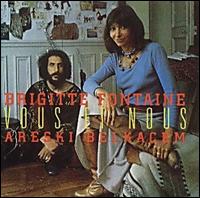
Vous et Nous is the ninth album by experimental pop French musician Brigitte Fontaine and the seventh by Areski Belkacem, released in 1977 on the Saravah label. Vous et Nous is an avant-garde double album mixing a variety of instruments and vocal styles. The album uses synthesizer and drum machine on some songs. Other, more acoustic, songs show the Algerian/African influence that Fontaine and Areski were known for. The album was not well understood upon release, but in later years was championed by musicians such as Jim O'Rourke and Stereolab.
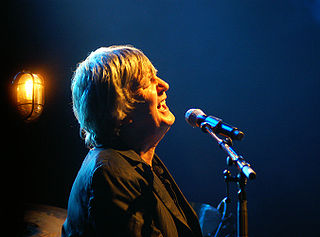
Jacques Joseph Victor Higelin was a French pop singer who rose to prominence in the early 1970s.

Saravah is a French jazz record label founded by singer-songwriter Pierre Barouh in 1965.

Pierre Barouh was a French writer-composer-singer best known for his work on Claude Lelouch's film A Man and a Woman as an actor and the lyricist/singer for Francis Lai's music score.
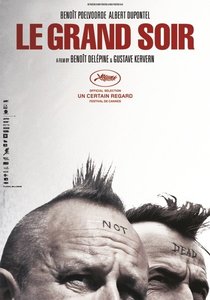
Le Grand Soir is a 2012 French-Belgian comedy-drama film directed by Benoît Delépine and Gustave de Kervern. The film competed in the Un Certain Regard section at the 2012 Cannes Film Festival where it won the Special Jury Prize. It won the Magritte Award for Best Costume Design.
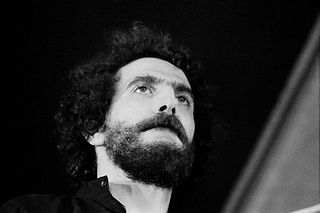
Areski Belkacem, also known simply as Areski, is a French singer, multi-instrumentalist, comedian and composer.
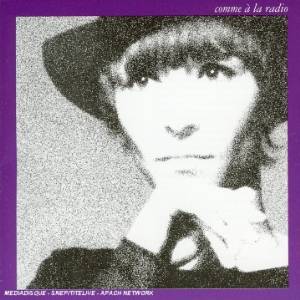
Comme à la radio is the fourth album by experimental French singer Brigitte Fontaine, recorded with Areski Belkacem and the Art Ensemble of Chicago. It was released in 1969 on the Saravah label after a series of concerts in 1969. It is Fontaine's most famous album, and is known outside of France on the 1990s alt-rock scene, thanks to laudatory comments from Beck Hansen, or Sonic Youth among others.

Je ne connais pas cet homme is the sixth album by experimental French singer Brigitte Fontaine and the fourth by Areski Belkacem, released in 1973 on the Saravah label. It is their second collaborative album, and the first of a string of albums co-credited to both artists.
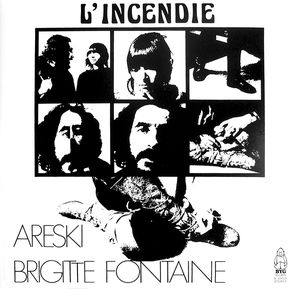
L'Incendie is the seventh album by experimental French singer Brigitte Fontaine and the fifth by Areski Belkacem, released in 1974 on the Byg Records label. It is their third collaborative album.
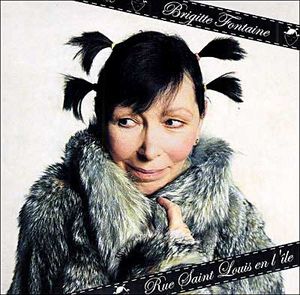
Rue Saint Louis en l'Île is the fifteenth album by experimental French singer Brigitte Fontaine, released in 2004 on the Virgin Records label. It features a new version of Le Nougat from her French corazon album with Mustapha and Hakim Amokrane of French band Zebda, as well as a duet with Areski Belkacem, Le Voile à l'école. There's also a cover of Édith Piaf, L'Homme à la moto, which was present before on an hommage album to the singer, in the words of Fontaine, "just to show off".

Libido is the sixteenth album by experimental French singer Brigitte Fontaine, released in 2006 on the Polydor label. It once again features a collaboration with -M- on the song Mister Mystère, which -M- also sang solo on his fourth album, to which it gave its title. Brigitte Fontaine, for the first time in more than thirty years, calls upon arranger Jean-Claude Vannier for some songs, Barbe à papa and Mendelssohn. The title of Château intérieur comes from a book by Teresa of Ávila, although Fontaine admitted she didn't read it.

Prohibition is the seventeenth album by experimental French singer Brigitte Fontaine, released in 2009 on the Polydor label. The album features political content, as it is described by Fontaine as "a rebellious album", and the song Partir ou rester was written as a reaction to the 2007 French presidential election.

J'ai l'honneur d'être is the nineteenth album by experimental French singer Brigitte Fontaine, released in 2013 on the Universal Music Group label. Areski Belkacem composed and arranged all songs except La Pythonisse and Les Crocs, which were composed and arranged by Jean-Claude Vannier.

Higelin et Areski is the second album by French rock singer Jacques Higelin and the first credited to Areski Belkacem. Higelin and Areski met at the army, and Higelin would later introduce Areski to Brigitte Fontaine, who would become his lover and creative partner. The songs on the album are mostly minimalistic and experimental.

Un beau matin is the first solo album by French experimental singer and composer Areski Belkacem, released in 1970 on the Saravah label. He would not release a new solo album until Le Triomphe de l'amour in 2010, instead collaborating with his lover and creative partner Brigitte Fontaine for the next few decades.
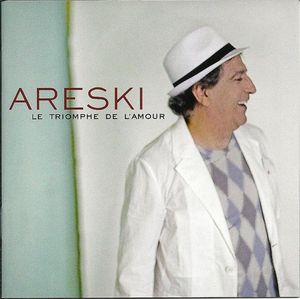
Le Triomphe de l'amour is the second solo album by French experimental singer and composer Areski Belkacem, released in 2010 on the Universal Music Group label. It is his first solo album in four decades, having instead collaborated with Brigitte Fontaine in the meantime.
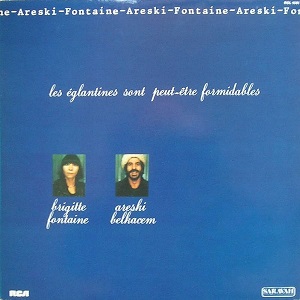
Les églantines sont peut-être formidables is the tenth album by French experimental pop musician Brigitte Fontaine and the eighth by Areski Belkacem, released in 1980 on the Saravah label. Because of its arrangements, described as almost "disco" by Fontaine herself, a sound that she can't stand, she has disowned the album and refused its re-release on CD, although it has been pressed in Japan in October 2008 by the Columbia Music Entertainment label.

















